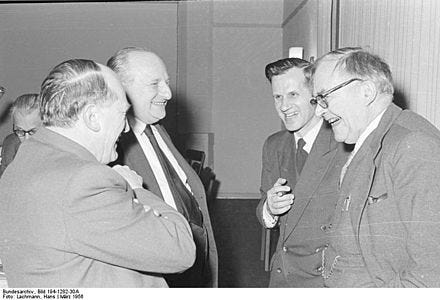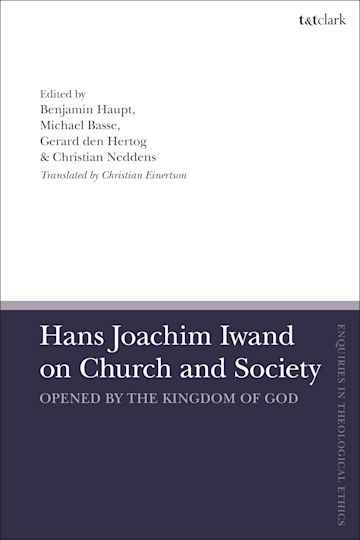The Theological Rationale for Protest
Historical and contemporary reflections on patriotism and dissent
Several months ago, I had the good fortune of running into Concordia Seminary professor Ben Haupt at the allergist. Ben and I struck up a conversation as we waited the obligatory thirty minutes to ensure that neither of us had an adverse reaction to our shots. We both left with our allergies under control, but before parting, he mentioned that he had recently edited some work by the German Lutheran theologian Hans Joachim Iwand.
I’m a big Iwand fan and have been especially influenced by his classic work, “Zur theologischen Begründung des Widerstandes gegen die Staatsgewalt.”
Okay, okay, I don’t know German, and I hadn’t heard of Iwand before talking to Ben. Nevertheless, I was intrigued enough by our discussion and wanted to learn more. Ben sent me a copy of Iwand’s 1952 presentation, “Toward a Theological Rationale for Protest Against the Government.” Iwand had prepared these remarks as testimony in the trial of Major General Ernst Otto Remer, who had helped thwart the assassination of Hitler in 1944.
In the era surrounding the Second World War, prominent theologians like Dietrich Bonhoeffer and Karl Barth wrestled with the question of when and whether to protest against the government. Their work has received significant historical and scholarly attention.
Iwand adds some important dimensions to this larger body of work. He begins by calling attention to Christian complacency during the early days of Hitler’s rise to power, which served as the precursor to Christian complicity in the horrors of Nazi Germany:
We did not grasp—we did not even grasp this from the perspective of the roots of our Christian conviction—that just as soon as the freedom of conscience in public life is threatened, our individual freedom is lost. . . .
Resistance remained limited to the private, personal sphere. We had allowed this tool to be taken out of our hand, a tool that a responsible society needs so that the voice of conscience and consideration of human rights could be effective in the activity of public life, so that we could protect the state against its descent into the abyss of tyranny.
In this context, Iwand invokes Hegel’s characterization of the state as the “ordinatio Dei”—“the state, even in its most depraved form, remains the divine as it appears outwardly.” Iwand elaborates:
[W]hen one begins with this theory of the state, even the oath and the existence of civil servants are bound indissolubly to the state with a bond that is subject to no higher norm than the very one that is the actualization of the moral in the world. The possibility of saying “no” to the state, the possibility of proclaiming that “no” from a true moral commitment and putting that “no” into practice, has disappeared.
Whatever your politics and whatever your religion, Hegel’s descriptive account of the state positioned by Iwand in the context of postwar Germany ought to give you pause. I’ve had occasion to reflect on some related issues. As I write in Learning to Disagree:
I’m okay with a healthy dose of patriotism. One of the proudest moments of my life was when my dad—a career Army officer—administered the oath of office to me when I was commissioned as a second lieutenant in the Air Force. I have spent a lot of time with service members, some of whom risk more in a day than most of us do in a lifetime. Still, there is a part of American patriotism that feels off to me.
I noted that as an attorney and a former military officer, I have previously taken oaths to “support and defend the Constitution of the United States against all enemies, foreign and domestic” and to “bear true faith and allegiance to the same.” And then I ask:
What if my own faith commitments became “enemies, foreign and domestic,” of the Constitution? If that seems implausible, think back to the three-fifths clause and work your way forward. What does it mean to pledge unqualified allegiance to a Constitution that has at various times upheld the enslavement of other human beings, denied the right to vote to women and African Americans, enabled the Japanese-American internment, and facilitated Jim Crow, to name just a few of the more glaring examples? Each of these actions once upheld as constitutional cuts against the core tenets of my faith—and hopefully yours as well.
I conclude by calling attention to my current practices:
I no longer swear oaths. I don’t even pledge allegiance to the flag or put my hand over my heart during the national anthem. I still stand at attention—as a veteran, I think it’s important to honor the significance of these solemn occasions. I just don’t want to give them too much significance.
I don’t know what Iwand would make of all of this. But at the very least, it keeps alive in me a tiny voice that, to borrow Iwand’s language, retains “the possibility of saying ‘no’ to the state.”
I would like to think I would have the courage to act on that conviction if directly confronted with a demand from the state that contravenes my more primary commitments. But I’ll bet a lot of German Lutherans in the 1930s thought that of themselves, too. The truth is that we don’t really know how we will act in a given situation until we actually face it.
As Iwand mournfully observes of the German context:
In what took place here, we experienced the manifestation of a cultural decision or maybe we should say a process that chose power and not justice, a process that had long been primed among us, a process toward which we had been marching as if blindfolded and that we only really recognized in its full horror after it was too late, after the gates of freedom whose vision we had long since betrayed had shut behind us.
Whatever one thinks about the current state of American politics, one lesson from Iwand and the context in which he wrote might be that the theological question of when to engage in protest and resistance is as much about discerning when the ground begins to crack as it is about finding the courage to confront the more glaring violations once they have manifested.
If you’re interested in learning more about Iwand, check out this recent compilation of his work edited by Professor Haupt and colleagues.
An Update about Learning to Disagree
I’m delighted to share that PBS Books has selected Learning to Disagree as one of its June book picks:
If you don’t yet have a copy, please consider picking one up and even leaving an Amazon review. Unless you plan to read just the introduction and leave a review based on your whimsy—in that case, ignore my request!








Found your Substack through your CT interview—heartened by the thoughtfulness and generosity of your approach to difficult topics. Excited to follow along here : )
I'm a little more comfortable with patriotism than this suggests--though I would also think of patriotism as loyalty to a country or a people (my fellow countrymen and countrywomen) rather than to the state. Many years ago I wrote something on this that I still think has held up fairly well (https://www.firstthings.com/article/2003/02/christians-as-patriots). But it is also hard to beat the ten pages on patriotism in C. S. Lewis's opening chapter of The Four Loves, where he discusses loves for the "sub-human."